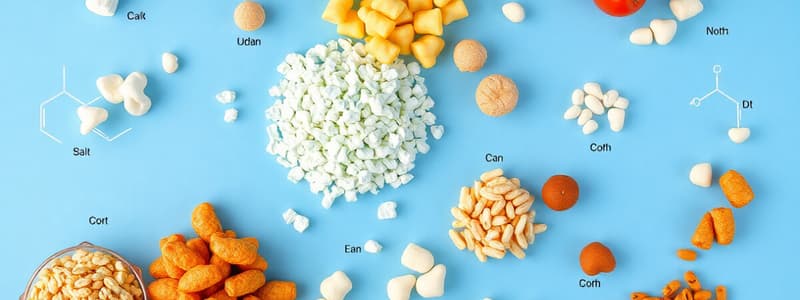Podcast
Questions and Answers
What is the simplest form of carbohydrates?
What is the simplest form of carbohydrates?
- Disaccharides
- Polysaccharides
- Monosaccharides (correct)
- Oligosaccharides
Which carbohydrate is primarily involved in energy storage in animals?
Which carbohydrate is primarily involved in energy storage in animals?
- Glycogen (correct)
- Starch
- Cellulose
- Galactose
What is the primary source of energy for the body?
What is the primary source of energy for the body?
- Carbohydrates (correct)
- Vitamins
- Proteins
- Fats
What process creates disaccharides from monosaccharides?
What process creates disaccharides from monosaccharides?
Which of the following is a storage polysaccharide in plants?
Which of the following is a storage polysaccharide in plants?
Which monosaccharide is a primary component of lactose?
Which monosaccharide is a primary component of lactose?
What role does cellulose play in plants?
What role does cellulose play in plants?
Which carbohydrate is often processed and may have lower nutritional value?
Which carbohydrate is often processed and may have lower nutritional value?
What is the initial enzyme involved in carbohydrate digestion?
What is the initial enzyme involved in carbohydrate digestion?
Which hormone regulates blood glucose levels in the body?
Which hormone regulates blood glucose levels in the body?
Flashcards
Monosaccharides
Monosaccharides
The simplest form of carbohydrates; single sugar units like glucose, fructose, and galactose.
Disaccharides
Disaccharides
Carbohydrates formed by linking two monosaccharides.
Polysaccharides
Polysaccharides
Complex carbohydrates formed by linking many monosaccharides.
Glucose
Glucose
Signup and view all the flashcards
Sucrose
Sucrose
Signup and view all the flashcards
Starch
Starch
Signup and view all the flashcards
Glycogen
Glycogen
Signup and view all the flashcards
Carbohydrate Digestion
Carbohydrate Digestion
Signup and view all the flashcards
Cellular Respiration
Cellular Respiration
Signup and view all the flashcards
Dietary Fiber
Dietary Fiber
Signup and view all the flashcards
Study Notes
Classification of Carbohydrates
- Carbohydrates are organic compounds composed of carbon, hydrogen, and oxygen, typically with a 1:2:1 ratio (e.g., C6H12O6).
- They are broadly classified into monosaccharides, disaccharides, and polysaccharides.
- Monosaccharides are the simplest form, including glucose, fructose, and galactose.
- Disaccharides are formed by the linkage of two monosaccharides (e.g., sucrose = glucose + fructose; lactose = glucose + galactose).
- Polysaccharides are complex carbohydrates formed by the linkage of many monosaccharides (e.g., starch, glycogen, cellulose).
Functions of Carbohydrates
- Provide energy: Carbohydrates are the primary source of energy for the body. Glucose, a monosaccharide, is the body's preferred energy source.
- Structural support: Cellulose is a structural component of plant cell walls.
- Storage of energy: Glycogen is the storage form of glucose in animals. Starch is the storage form of glucose in plants.
- Dietary fiber: Some carbohydrates are indigestible and act as dietary fiber, promoting gut health.
Monosaccharides
- These are the simplest carbohydrates.
- Important examples include glucose, fructose, and galactose.
- Glucose is crucial for cellular respiration and energy production.
- Fructose is found in fruits and honey, and is metabolized differently than glucose.
- Galactose is a component of lactose (milk sugar).
Disaccharides
- Formed by the condensation reaction of two monosaccharides, releasing a water molecule.
- Examples include sucrose (glucose + fructose), lactose (glucose + galactose), and maltose (glucose + glucose).
- Sucrose is table sugar; lactose is found in milk; maltose is a product of starch digestion.
Polysaccharides
- Complex carbohydrates composed of many monosaccharides linked together.
- Starch is a storage polysaccharide in plants.
- Glycogen is a storage polysaccharide in animals.
- Cellulose is a structural polysaccharide in plant cell walls.
Digestion and Absorption
- Carbohydrate digestion begins in the mouth with salivary amylase.
- Pancreatic amylase further breaks down carbohydrates in the small intestine.
- Monosaccharides are absorbed into the bloodstream and transported to cells for energy production.
- The body regulates blood glucose levels using hormones like insulin and glucagon.
Sources of Carbohydrates
- Dietary sources include grains, fruits, vegetables, and dairy products.
- Refined carbohydrates, often processed, may have lower nutritional value.
- Unrefined carbohydrates, often whole foods, contain more fibre.
Health Implications
- Excess carbohydrate intake can lead to weight gain and potential health issues, including type 2 diabetes.
- A balanced diet including complex carbohydrates is recommended.
- Adequate intake of dietary fiber is vital for digestive health.
Types of Dietary Fibers
- Soluble fiber: Dissolves in water, can help lower cholesterol and regulate blood sugar.
- Insoluble fiber: Doesn't dissolve in water, aids in bowel regularity.
- Both types are crucial for good digestive health.
Studying That Suits You
Use AI to generate personalized quizzes and flashcards to suit your learning preferences.




